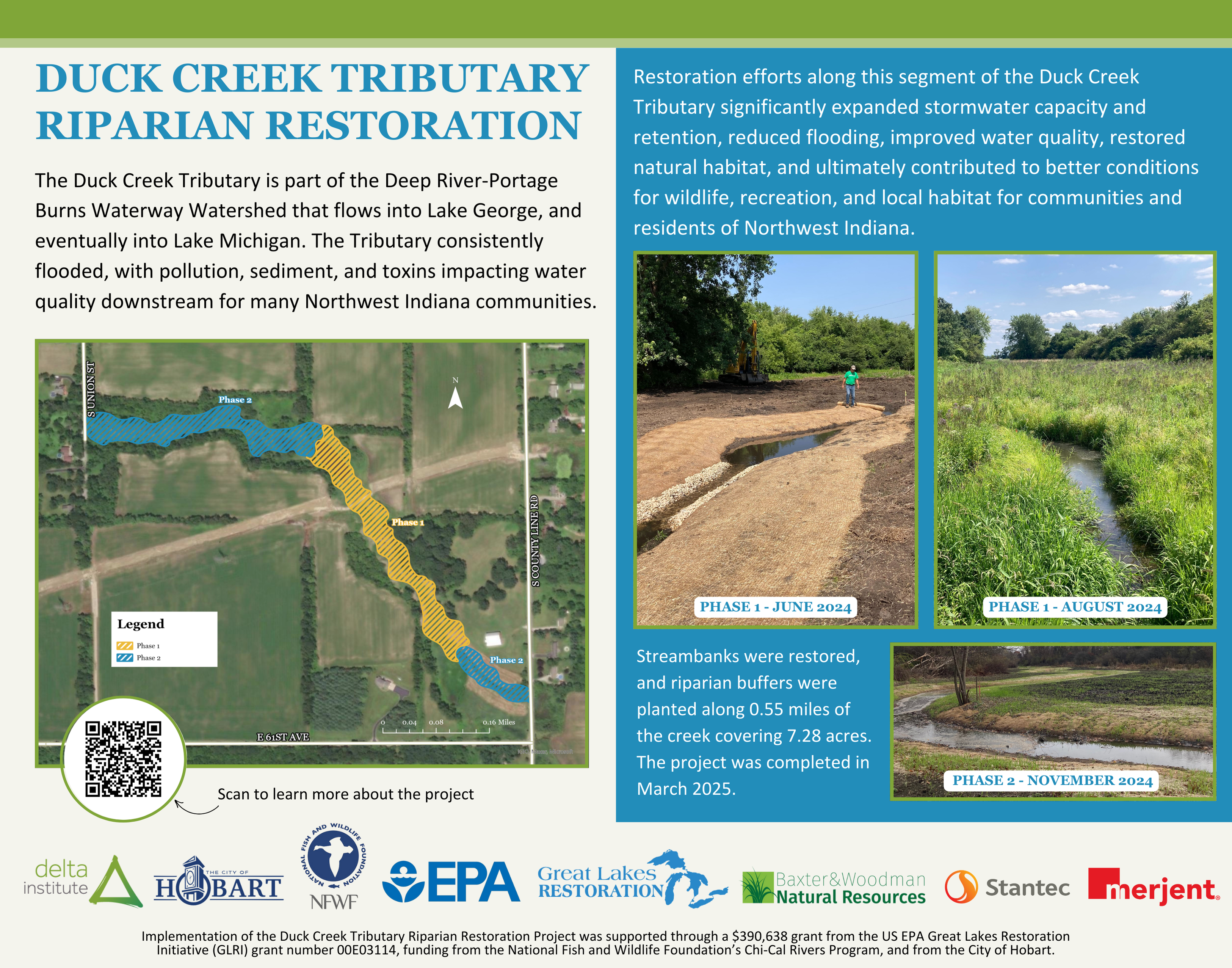
Delta Institute is restoring a key waterway in Hobart, Indiana, that flows throughout the entire watershed and ultimately into Lake Michigan. Currently the waterway, the Duck Creek Tributary, overflows with pollution, sediment, and toxins—impacting the water quality downstream for many communities, including multiple that are designated Environmental Justice (EJ) communities.
Why Our Work is Needed Today
The Duck Creek Tributary in Hobart, Indiana is part of the Deep River-Portage Burns Waterway Watershed, which flows into the Little Calumet River and ultimately into Lake Michigan. The extensive flooding along the Tributary causes significant water quality issues due to sediment, agricultural, and nutrient runoff. Streambank restoration along this segment of the Duck Creek Tributary will reduce flooding, improve water quality, restore natural habitat and ultimately contribute to improved conditions for wildlife, recreation, and communities throughout the watershed in Northwest Indiana.
Our restoration efforts directly align with identified issues per local-, watershed- and regional plans. The Great Lakes Restoration Initiative Action Plan and 2020 Indiana State Forest Action Plan call for restoring forests in riparian areas and that forested buffers around perennial watercourses improve water quality, wildlife habitat, and protect soil resources by buffering runoff and improving infiltration/water quality. The need for these improvements to the water quality and streambank habitat in the Tributary to Duck Creek is a component of the Deep River Portage Burns Waterway Watershed Management Plan. Delta always ties our programmatic efforts into existing plans.
Brief Overview of What We’re Doing
Delta Institute successfully completed two phases of restoration work between 2019-2024 with the City of Hobart and the Hobart Sanitary District (HSD) to implement streambank stabilization, habitat restoration, and riparian buffer installation to improve permeability and infiltration along the Tributary corridor along a cumulative 0.55 miles of riparian corridor restoration.
Delta is providing project management and oversight, and is supporting procuring and retaining contractors that specialize in water resource engineering and wetland and streambank restoration, with key objectives that focused on increasing stormwater capacity and infiltration, reducing nonpoint source pollution from entering the creek, preventing erosion and damage to surrounding infrastructure, and improving the instream and riparian habitat.
We are pleased to share that we exceeded our goal metrics, with more than 289,486 cumulative gallons of stormwater captured and treated annually, along with more than 256 tons of sediment kept from entering the watershed and Lake Michigan!
Our Project’s Cumulative Impact
Key metrics from our collaborative restoration project include:
- Flood Reduction and Stormwater Management: 2,786 gallons of stormwater storage added, captured and infiltrated per year; which will substantially lesson localized flooding on county and municipal roadways.
- Riparian Corridor Restoration: The project restored 2850 linear feet (0.5463 miles) of riparian corridor from the corner of E 61st Ave and S County Line Road to S Union St. in the Duck Creek watershed (040400010506).
- Erosion control: A substantial volume of 256 tons of sediment inputs avoided annually. The estimated sediment reductions were modeled using EPA’s Pollutant Load Estimation Tool (PLET); the installed project includes a 35 ft. wide grass buffer BMP treating 1,610 acres of cropland–which is equivalent to 35.7% of the 4,509 acres of cropland in the Duck Creek watershed.
- Water Quality Improvement: 715 lbs. of phosphorus inputs avoided annually; 2,786 lbs. of nitrogen inputs avoided annually.
- Habitat Restoration: 0.5463 miles of instream and riparian habitat restored, complete with low-flow areas, whiffle pooling, and other micro-habitat creation for local species. Native grass plantings were extensively utilized, with invasives removed.
We are proud and pleased of these metrics indicating improved environmental outcomes that will impact the entire Deep River – Portage Burns Watershed that drains into Lake Michigan.
Duck Creek Tributary Restoration project wins the 2024 Indiana Governor's Award for Environmental Excellence
Delta Institute and the Hobart Sanitary District won the Indiana Governor’s Award for Environmental Excellence for Land Use/Conservation on Tuesday, September 17th, 2024. The Governor’s Awards for Environmental Excellence are Indiana’s most prestigious environmental recognition awards. They are reserved for the most innovative, sustainable, and exemplary programs or projects that positively impact Indiana’s environment and demonstrate measurable environmental, economic, and social benefits.

